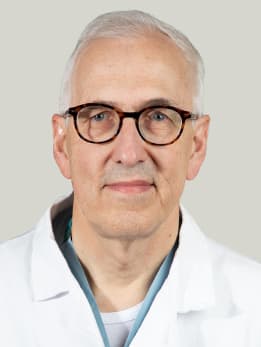First-of-its-kind stem-cell transplant treatment targets drug-resistant focal epilepsy

Jonathan Nemeth of Batavia, Illinois, pictured with his dog, Ember. (Photo by Mark Black)
Jonathan Nemeth's epilepsy is so severe that muscle contractions from seizures broke his spine twice. Effects of the neurological disorder also postponed his typical life milestones, such as getting a driver’s license.
"I kind of just stay at home," Nemeth said. "Mentally, it doesn't necessarily make me stressed as much as it makes me depressed. I'm driven around everywhere by friends or my mom, and it makes me feel like a burden."
Despite those challenges, the 22-year-old is cautiously optimistic. He has been seizure-free since undergoing a pioneering operation in February that involved transplanting stem cells into the area of the brain causing his seizures.
The experimental treatment is part of the first in-human clinical trial investigating the safety and efficacy of lab-grown interneuron cells to treat seizures in deep areas of the temporal lobes on both sides of the brain.
"This is a first step in treating the underlying biology of this type of epilepsy," said Peter Warnke, MD, Director of Stereotactic and Functional Neurosurgery at the University of Chicago Medicine, and the trial's local principal investigator. "All other current treatments — whether resecting, using laser ablation or electrical stimulation — are just removing or silencing tissue."
Rebalancing electrical activity in the brain
Approximately three million people in the U.S. have epilepsy, and up to 35% of those individuals experience ongoing seizures despite taking medications for the illness. During a seizure, the brain's electrical signals operate too synchronously and out of control.
For Nemeth, who has medication-resistant bilateral mesial temporal lobe epilepsy, this burst of uncontrolled electrical activity can cause staring episodes, confusion, memory lapses or uncontrolled movements.
Prior to his stem cell treatment, Nemeth was having several focal seizures per week and one to two generalized seizures every month. Medications had little to no effect, and because Nemeth's seizures affect both sides of his brain, surgical resection or ablation were not an option.
The reality of having epilepsy sunk in during Nemeth's freshman year when he had a seizure during class.
"My friend helped escort me to the nurse ... He told me that I kept saying 'Ow,' putting my hands toward my head and smacking my lips," said Nemeth, a resident of Batavia, Illinois. "I was completely unconscious during all of it."
Repeated seizures can cause a loss of interneurons, the cells in the brain that help communicate with other cells, process information and control movements. Interneurons secrete gamma-aminobutyric acid (GABA), a neurotransmitter that stops hyperactive brain cells from firing and causing seizures.
Nemeth's stem cell transplant aims to essentially replenish those inhibitory cells and rebalance the electrical activity in his brain.
Seizure-free and hopeful
During the operation, Warnke first used an imaging system to precisely target areas in Nemeth's hippocampus, the area of his brain causing seizures.
Using a stereotactic robot, Warnke directed a narrow tube through Nemeth's skull to specific spots in each hippocampus and injected the tissue with stem cells. Then, the UChicago Medicine team conducted further imaging to ensure the cell deposits were perfectly placed.
"Numerous experimental studies have shown long-term integration of the cells into the host brain and maintained GABA secretion by the cells," Warnke said.
Now seizure-free, Nemeth is being closely monitored. Because the stem cells were cultured in a lab, Nemeth will take immunosuppressive medications for roughly one year while the cells integrate into his brain. He and his doctors are hopeful that the results are long-lasting.
"The way this is progressing, maybe — maybe, over time, just maybe we can get a cure for epilepsy," Nemeth said.
The procedure, Warnke said, is a starting point for a new and promising approach to helping those with epilepsy. "In this context, the treatment of epilepsy using implanted interneurons is truly restorative neurosurgery," he said.
UChicago Medicine is recruiting patients for this clinical trial and a similar study for unilateral MTLE:

Peter Warnke, MD
Internationally renowned neurosurgeon Peter Warnke, MD, has performed more than 5,000 stereotactic surgeries and more than 2,000 brain tumor surgeries. Dr. Warnke provides neurosurgical care for the treatment of adults and children with movement disorders, epilepsy and brain tumors.
Learn more about Dr. Warnke
Image-Guided Laser Surgery Becoming Go-To Option for Epilepsy
In a clinical trial, our neurosurgeons use minimally invasive, image-guided laser surgery to treat certain types of epilepsy.
Read the articleRequest an Appointment
We are currently experiencing a high volume of inquiries, leading to delayed response times. For faster assistance, please call 773-702-6222 to schedule your appointment.
If you have symptoms of an urgent nature, please call your doctor or go to the emergency room immediately.
You can schedule an appointment instantly with one of our Epilepsy experts through our online scheduling portal.
* Indicates required field
